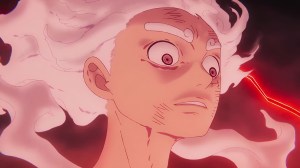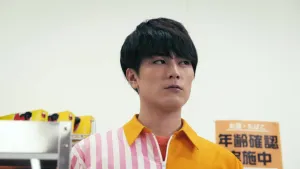What happens when the world’s most fastidious lawyer has the power to change the world with wishes? That’s the premise behind Three Little Wishes, the new graphic novel from Paul Cornell (Doctor Who, I Walk With Monsters) and Steve Yeowell (Zenith), with letter Simon Bowland and colorist Pippa Bowland. Kelly, a “finicky” lawyer, comes to possess a bottle containing Oberon, king of the fairies. He’s bound to grant her three wishes, but Kelly knows how tricky wishes can be and goes out of her way to avoid an unfortunate ironic ending. Instead, she uses all of her legal skills and attention to detail to make a perfect wish.
Videos by ComicBook.com
At first, the results are oddly funny. Then, things get complicated when an old boyfriend comes back into her life. What follows is a charming fantasy romantic comedy story. ComicBook.com had the opportunity to speak to Cornell about Three Little Wishes, and of course, we couldn’t let the writer of “Human Nature,” “Family of Blood,” and many more Doctor Who multimedia stories get away without asking him for his thoughts on the franchise’s upcoming new era. Here’s what he had to say:
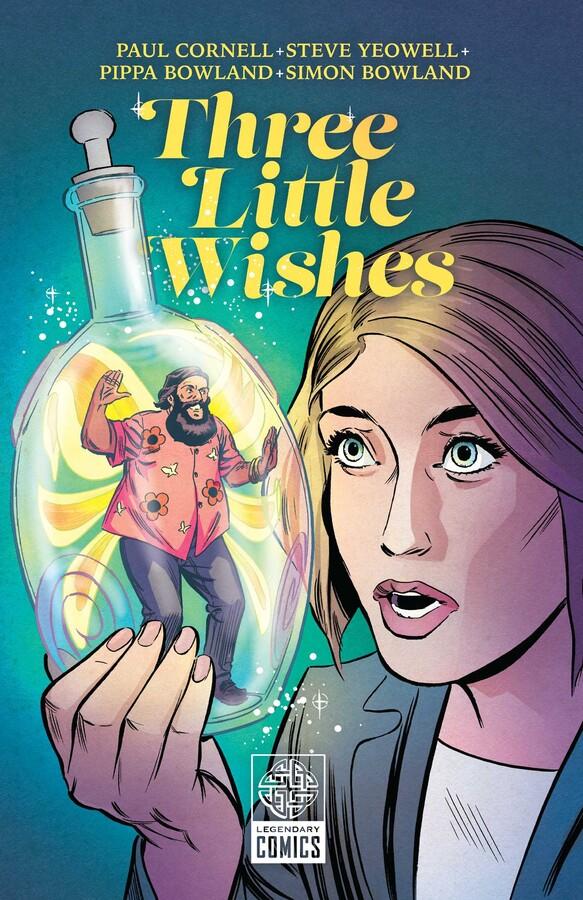
What was the genesis of Three Little Wishes? Where did the first germ of the idea come from, and how did it progress?
Paul Cornell: Well, I was sitting in a meeting with my agent in New York and she was talking about her husband, who is a contract lawyer. I suddenly thought, “I’ve had in the back of my head this idea for somebody who gets wishes and uses them to fix the world, and wouldn’t it be great if they were a contract lawyer because fine detail?” That’s just not what a fairy granting wishes expects to encounter. In this book, our heroine, who is a finicky contract lawyer — I cannot speak to the finicky or otherwise of my agent’s husband — is the king of the fairies, Oberon, from a bottle after thousands of years of imprisonment.
He offers her three wishes. He’s that kind of fairy who likes to trick humans by following the precise wording of their wishes and doing awful things to them as a result, except this time around, she does multiple drafts of her wish and records it, puts a lot of thought into it and he can’t get round it. Thus begins a contest of wits. Our heroine is trying to fix the world until it turns out her ex, who she still loves, has something in his life which could really use a wish. He doesn’t want her to waste a wish, but she’s sorely tempted and all sorts of things go wrong. It is a fantasy rom-com.
Did you have to do a lot of research for the finicky lawyer stuff? Or do you have a history with the law yourself?
With law. I thought you were going to say with finicky-ness. I do have a history with finicky-ness. My wife and I are complete opposites in that regard, in that you could almost draw a dotted line down the middle of our bedroom. On my side, it’s very neat. I’m a very organized person. I discovered during my mother’s dementia that I’m autistic. That is to say, my mum said that I had been diagnosed as autistic as a child, and they never told me. They never told anyone else. Sure enough, there it is on my medical records. I’m kind of, I think, like an inverse spark. I have inside me a nature that I had no idea about; the nature of my son, who is autistic and can thankfully live openly with that, unlike me apparently. Kelly does vaguely touch on this, but she’s very, very order minded.
I think this is something that the world could do with more of, people who do sweat the small stuff and worry about the details and aren’t, “Hey, I do the big picture. I’ll leave the finicky stuff to some other people who are good to come along.” She is one of those other people. I very much empathize with that. In terms of the law research, to get back to your actual question instead of inventing an entirely different question, no. I did get to ask my agent to pass on a few questions. I got some good stuff back actually, so actually, the answer is yes, I did a little.
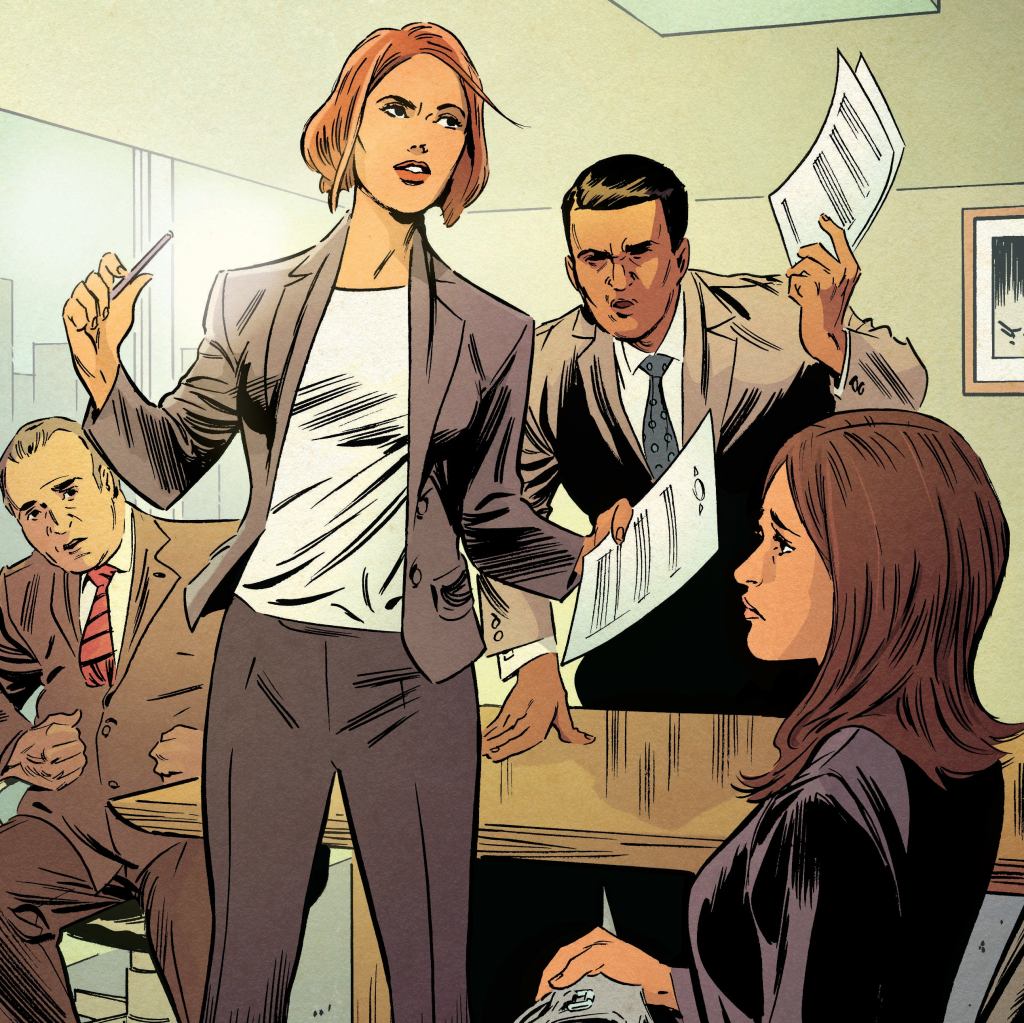
Wishing to fix the world is the big idea, but you could have gone in any number of directions with that. How did you land on “fantasy rom-com?”
Well, I always wanted to write a rom-com. I love the form. It never was anything else in my head. I can absolutely see the possibility for doing it seriously, and indeed there are serious notes in the book because this is a comedy about big stuff. But I love rom-coms. At their best, they, I think, are the most difficult thing to write because they’re all about fine detail, and they’re all about very precise plotting, but at the same time, you’ve really got to feel. There’s nothing worse than a bad rom-com.
And why did you choose to do this as a comic book? Why not prose or anything else?
I guess I’m really loving the way that the graphic novel has opened up in the last couple of years, the original graphic novel, as much more possible than it used to be. I think this is a good space to tell quite large one-off stories. I’m attracted towards that. This isn’t my last. I’ve got another one being announced in five minutes. Well, not five minutes literally, but it’s maybe sometime this week. It’s soon. Anyway, that’s all they tell you, it will suddenly happen and I won’t be entirely surprised by it. I just think it’s a form that’s happening. I hope to still get to write it as a movie, but it just seemed to be where it’s at because I’ve done such a lot of comics, I often have my first thought as, “Could this be a comic?” There’s very little that couldn’t. Maybe there’s a certain sort of interior SF novel that you’d have a hard time playing that way.
You mentioned that there’s nothing worse than a bad rom-com. They could be very difficult. Was there any part of this — any particular character, any particular scene — that you found especially challenging to get right?
There is one thing. I wrote this during the height of the Black Lives Matter movement. Kelly’s first wish is to end all violence so that no act of violence can successfully be accomplished. The blows just do not land. The explosions do not go off. I wrote something about how this changed the lives of Black people in the states. My editor Nikita [Kannekanti], who is amazing, really called me back from it and said, “That just becomes white savior. Our heroine has saved all the black people. No, we’re not going to do that.”
I’m really pleased she said that. Hence, there’s a scene in the book where our hero’s friend actually takes her to task for thinking that because racism will find a way damn it. That’s one of the things about this book. It does touch upon the big stuff and like a lot of comedy, comedy can go so far. Comedy can take you into the middle of places quite gently, but then you’ll find you’re in the middle. One of my favorite movies is the Life of Brian because all wisdom is there in, and this deep knowledge of human nature, very cynical knowledge of human nature there.
You’ve mentioned the big ideas this book touches on. Which was at the forefront of your mind when you sat down to write? Or did they come to you more gradually?
Well, I wanted to see who would be angry at the idea of taking violence away, and so we came up with some antagonists who cannot themselves do anything violent, hence Pigeon, the former professional assassin who’s now really annoyed that his reason to be has vanished. The ways in which one could still do harm while not being violent are interesting, and I thought the US government is going to think very hard about this very quickly and come at Kelly with something that is not violent and they do. That’s another major thread of the book, as is an arc for Oberon on the king of the fairies. It’s a redemption arc for him. There’s a lot going on here. I’m quite pleased by how it turned out.
I’m sure you’re going to, but I want to mention the art. I worked with Steve Yeowell on a short strip in the Ahoy Comics’ Edgar Ellen Poe’s Snifter of Terror. I knew Steve for his work on Zenith and still in 2000 AD, but I didn’t expect him on that short strip to have such a grasp of character comedy. That there was so much wryness in that strip and such a spot-on pointed sense of comedic timing. I thought, “I want to work with him on a comedy thing,” and then when this came along, I thought, “This is the person I want to work with.” I think he’s great on this. I think his expressions are so precise. The lettering and coloring is by the Bowlands, Pippa and Simon. There’s a California sunlight through the whole thing, which I really like. Yeah, I couldn’t be more delighted.
The strip in Edgar Allen Poe was a what if Dr. Jekyll hadn’t been Scottish but English. He becomes Dr. Jekyll and Mr. Slightly-Less-Jekyll. The awful things he does in his other persona, having drunk the potion are passing the port in the wrong direction, having tea at the wrong time of day, and cutting the end off the cheese. He becomes the terror of British society through his awful, awful manners. We thoroughly enjoyed ourselves with that. That requires a deadpan, which Steve is very well capable.
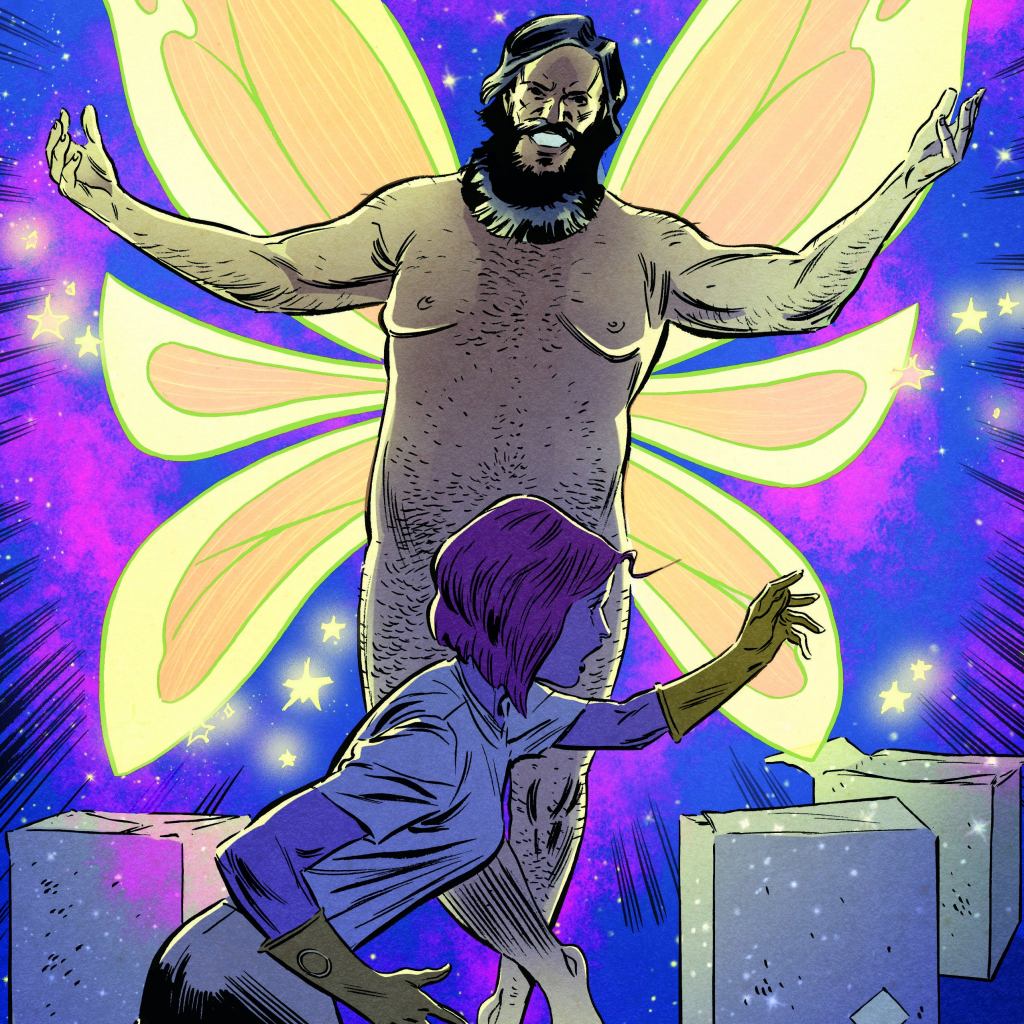
What was the collaborative process like? Did you have the full script sent off to let them do their thing or was there a lot of back and forth?
I wrote a 420-page script and Steve worked from that, but of course, there’s always back and forth. Basically, as soon as you get the roughs in, you’ve got an idea of the dynamics and you see what works and what doesn’t. One of the lovely things about comics, one of the ways which I really enjoy this medium specifically, is that right up until the day before press, you can change a bit of dialogue to accurately match an expression, you come together to achieve a certain pitch. Not only that, things he does make me have better ideas. I love the synergy. That’s how I like to work. It’s one of my favorite things.
It’s not quite as extreme as Peter David having the artist who didn’t speak English, and when he’d said “the guy bursts in with a chopper over his head” thinking he was carrying a chopper in his hand, he comes in with a small helicopter over his head, and Peter David wonderfully keeps it and goes with it. That’s the extreme version of going with what your artist has put in.
Since I have you, I know a lot of fans know you from Doctor Who, and that you’re a fan yourself. It feels like the is coming up on a turning point. There’s a new a new Doctor coming in, Russell T. Davies back as showrunner, the anniversary, all this stuff. As a fan and someone who has worked on it, what’s your take on where the series is headed? And is there any chance you’ll be contributing to it?
I am not. I’ve retired from Doctor Who many years ago, because I’ve done everything, in order to give somebody else a chance. I’m delighted by what Russell’s doing. I think we are going to get an even more radical, even more progressive Doctor Who. I think this is always Russell’s way. He is nothing if not confrontational with the audience, and he manages to confront the audience and have them love him for it. I thought his PR dance in announcing each of these beats of the new stuff was amazing. So far he has not put a foot wrong. I think we are lucky to have RTD, or give him his full name, “Retweeted,” on the show. He’s always going to be somebody who is both a great artistic TV writer and also somebody with a great grasp of popular drama. My goodness, that’s the combo you need on Doctor Who.
I do enjoy that he recognizes we’re in the age of internet fan theories, and so he just keeps preempting them by throwing out his own fan theories in Doctor Who Magazine. Like, “I’m just going to throw these out here. Why not?.”
One of the things I think he does that’s so clever is that his quote for each of the things that’s announced is the questions he wants people to be asking. It’s a series of usually three questions, just in case they’re not going to ask those questions, here they are. I think that’s wonderful.
Three Little Wishes is on sale now.





